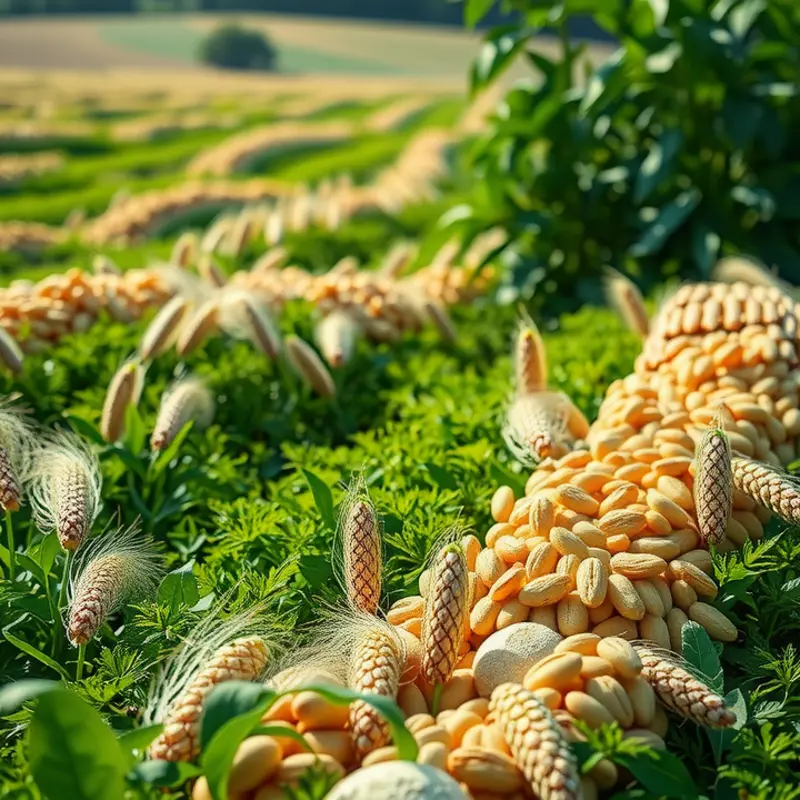Exploring climate-friendly proteins can inspire significant changes in our diets, benefiting both our health and the environment. As concerns about climate change grow, making eco-conscious food choices becomes essential. Plant-based proteins, legumes, and innovative alternatives offer sustainable options, not only reducing carbon footprints but also nourishing our bodies. Discover how these protein sources can fit into your lifestyle while making a positive impact on the planet.
Elevating Plant-Based Proteins

Plant-based proteins are not just a trend; they’re a sustainable, nutritious choice that can transform diets and benefit the planet. The abundance of options available—from legumes and nuts to seeds and whole grains—demonstrates nature’s richness in protein sources that are both healthy and environmentally friendly.
Legumes such as lentils, chickpeas, and beans are powerhouse foods, packed with protein, fiber, and essential vitamins. They are low in fat and help maintain a balance of nutrients necessary for a healthy metabolism. Incorporating legumes into your meals can significantly reduce the risk of chronic diseases, including heart disease and diabetes.
Nuts and seeds provide more than just crunch; they are rich in healthy fats, protein, and antioxidants. Almonds, walnuts, chia seeds, and flaxseeds are excellent sources of omega-3 fatty acids and other compounds that promote heart health. They offer versatility in the kitchen, enhancing both sweet and savory dishes with their distinct flavors and textures.
Whole grains such as quinoa, bulgur, and farro deliver complete proteins and are rich in B vitamins, iron, and magnesium. These grains are essential in maintaining energy levels throughout the day and supporting overall wellbeing. By choosing whole grains over refined ones, you contribute to more sustainable farming practices, as they generally require fewer resources and less processing.
The positive environmental impact of plant-based proteins cannot be overstated. They require significantly less water and land compared to animal farming, and their production results in lower greenhouse gas emissions. By reducing reliance on animal products, we can alleviate pressure on ecosystems and promote biodiversity.
Incorporating these sustainable proteins into daily meals is simpler than it seems. Start your day with a hearty breakfast of oatmeal topped with nuts and seeds. For lunch, a quinoa and chickpea salad is both refreshing and satisfying. Dinner can feature a nourishing stir-fry with tofu and a medley of your favorite vegetables. These are just a few ideas to get started with plant-based eating.
Transitioning to plant-based diets can support sustainable agriculture and possibly address some of the most pressing environmental issues. For practical ideas and unique recipes, explore our easy plant-based eating guide. It’s a step towards a healthier diet and a healthier planet.
To truly enjoy the benefits of plant-based proteins, experimentation is key. Explore different cuisines and cooking methods to discover new flavor profiles and textures. This not only satisfies your taste buds but also fosters a deeper connection with food and its origins, contributing to mindful and more sustainable eating habits.
Innovative Protein Alternatives

The demand for sustainable protein sources has given rise to innovative alternatives, significantly reducing the environmental impact of food production. Lab-grown meat and insect protein are leading this transformation, offering solutions that both reduce greenhouse gas emissions and ease the strain on natural resources.
Lab-grown, or cultured, meat is produced by cultivating animal cells in controlled conditions, bypassing the traditional need for raising and slaughtering livestock. This method drastically lowers methane emissions compared to conventional beef production. It also utilizes less land and water, making it a highly efficient alternative. A study suggests that lab-grown meat production can reduce land use by up to 99% and water use by up to 96% compared to traditional farming. As technology progresses, the texture and flavor of cultured meat are continually refined, making it an appealing proposition for meat lovers. Culinary applications range from lab-grown beef patties to gourmet cuts, presenting diverse recipe possibilities.
Insect protein is another innovation gaining traction for its high nutritional value and minimal ecological footprint. Insects require significantly less feed, water, and space than traditional livestock, cultivating them results in exponentially lower greenhouse gas emissions. An appealing feature of insects is their protein richness, often comparable or superior to that of beef or chicken. For example, crickets, a popular choice for insect protein, contain over 60% protein by weight. Insects can be ground into flour for baking or enjoyed whole in stir-fries, offering versatile culinary uses.
These proteins align with contemporary dietary trends that value environmental mindfulness alongside nutrition and taste. By embracing such alternatives, individuals can actively contribute to a sustainable ecosystem. For those in search of recipe ideas, try a cricket flour banana bread or a lab-grown meat burger paired with beetroot for an elevated dinner. Including these proteins in weekly meal planning introduces variety and supports ecologically sound eating habits.
Understanding how to integrate these proteins seamlessly into daily meals is crucial. For more inspiration on quick meal ideas that could incorporate such novel proteins, consider exploring resources like minimal prep dinner ideas. These sources can help blend sustainability with practicality, ensuring that climate-friendly proteins transition from trend to staple.
Incorporating insect and lab-grown proteins into our diet offers not only a reduction in our carbon footprint but also a culinary adventure. As these options become more accessible and acceptable, they are likely to play a pivotal role in transforming the global food landscape towards a greener future.
Final words
Embracing climate-friendly proteins is a powerful way to contribute to a sustainable future. By diversifying your protein sources and incorporating more plant-based foods and alternative proteins, you are not just making healthier choices for yourself, but also for the planet. The shift toward sustainable food systems requires collective effort, and every meal is an opportunity to make a difference. Let your plate reflect your values, and inspire others by leading through example.








